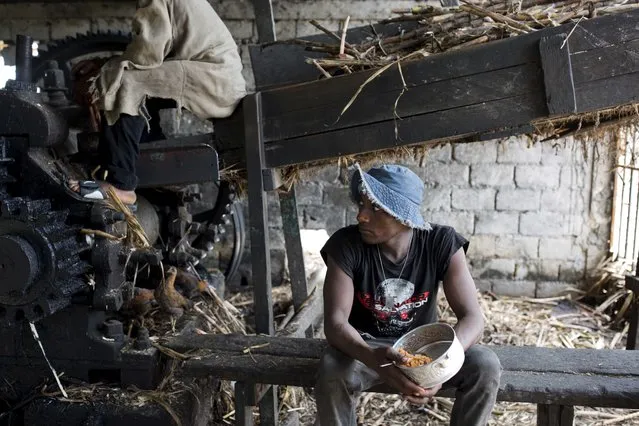
In this June 16, 2017 photo, Ronalson Chery, 26, eats rice and beans he brought from home as he takes a lunch break from moving sugar cane to the machine that extracts the juice at the Ti Jean distillery, which produces clairin, a sugar-based alcoholic drink, in Leogane, Haiti. Haiti's most famous export is Barbancourt, a delicately flavored, carefully aged rum that's considered among the best in the world. Then there's its rustic cousin clairin, a drink that's much cheaper and relatively rare outside this struggling Caribbean country. Clairin, or kleren as it's known in Haitian Creole, is less refined than rum and typically not aged, though some artisanal varieties are subjected to an aging process to give them a more mellow and distinctive flavor. It's produced at hundreds of small distilleries scattered across Haiti. At one of them, Ti Jean, in the coastal town of Leogane west of the capital, men with their heads covered to ward off the tropical sun use machetes to cut down the towering sugar cane stalks that surround the distillery. They feed the cane into a grinder to produce the juice that is the raw material of both clairin and the type of rum associated with the French Caribbean. Most rum produced elsewhere is made from molasses. The juice that flows out the other side is a murky caramel color, though the finished product will be as clear as vodka. The clairin is fermented and filtered and then shipped in plastic jugs for sale in market stalls and by street merchants. Individual retailers add flavors with herbs or fruit. (Photo by Dieu Nalio Chery/AP Photo)
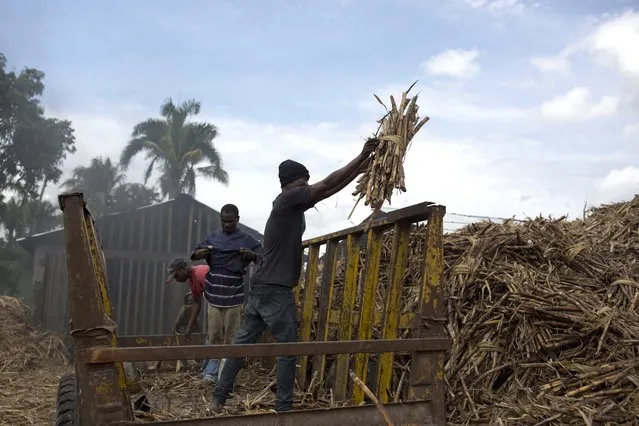
In this June 16, 2017 photo, workers unload sugar cane at the Ti Jean distillery, which produces clairin, a sugar-based alcoholic drink in Leogane, Haiti. Workers said that they earn a salary of 800 gourds, or $12.50 dollars, for each truck they fill with cane and that they manage to fill one truck in two days. (Photo by Dieu Nalio Chery/AP Photo)
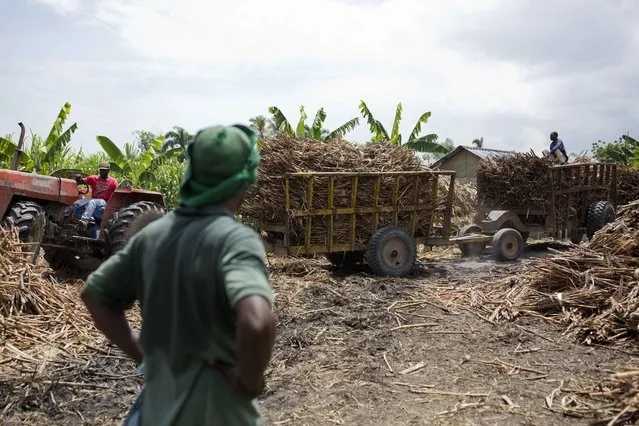
In this June 16, 2017 photo, a worker watches others bring in trucks of freshly cut sugar cane at the Ti Jean distillery, which produces clairin, a sugar-based alcoholic drink in Leogane, Haiti. After the sugar cane juice is fermented and filtered, it is shipped in plastic jugs to be sold in market stalls and by street merchants around the region. (Photo by Dieu Nalio Chery/AP Photo)
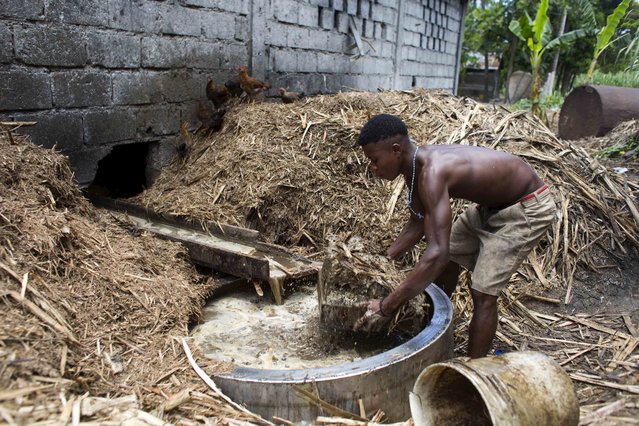
In this June 19, 2017 photo, Gabriel Shnaider, 22, removes bagasse, the leftover fiber after pressing juice from sugar cane, at the Ti Jean distillery which produces clairin, a sugar-based alcoholic drink, in Leogane, Haiti. The bagasse is later used to feed the fire that will cook the fermented juice. (Photo by Dieu Nalio Chery/AP Photo)
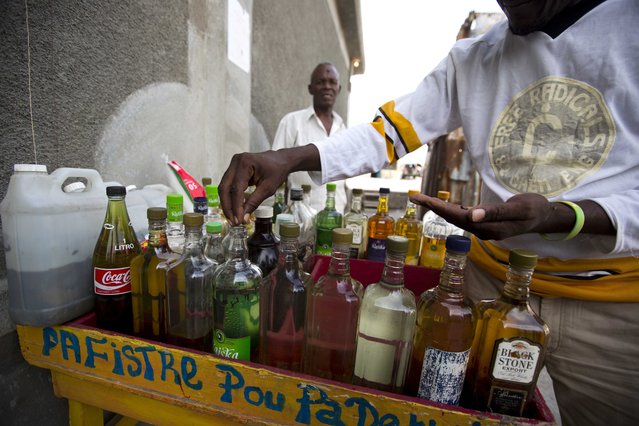
Eddy Lecty, who sells a sugar-based alcoholic drink known as clairin, adds cloves to spice up one of his bottles in the Cite Soleil area of Port-au-Prince, Haiti, Tuesday, July 11, 2017. Individual retailers who add flavors with herbs or fruit to the less refined version of rum reuse bottles carrying other labels. (Photo by Dieu Nalio Chery/AP Photo)
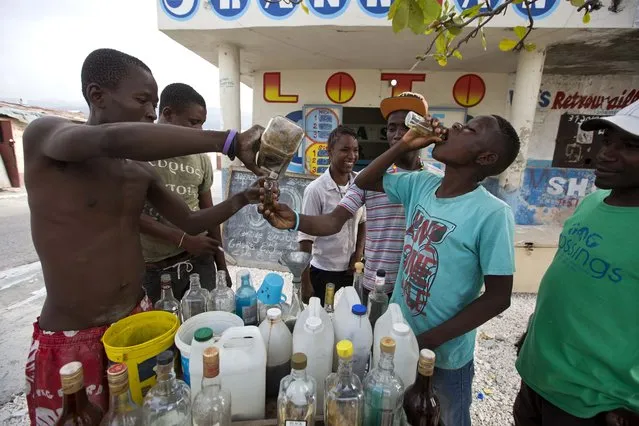
Metelus Obnes pours clairin for a client as Deluson Michel, 15, drinks a small bottle of the sugar-based alcoholic drink in the Cite Soleil area of Port-au-Prince, Haiti, Tuesday, July 11, 2017. A liter of clairin sells for about $1.36, a price tag that makes all the difference in a country where about 60 percent of the population gets by on less than $2 a day. (Photo by Dieu Nalio Chery/AP Photo)
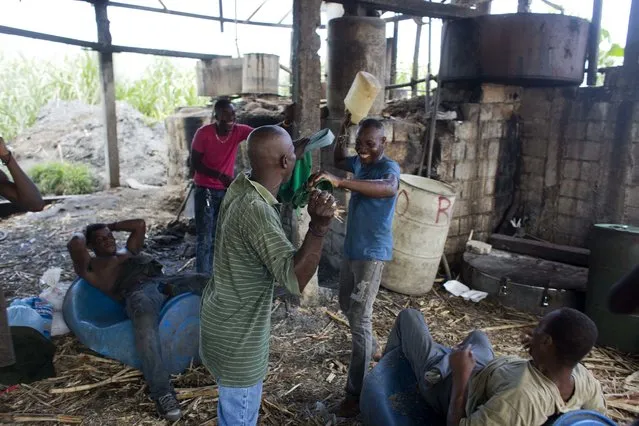
In this June 19, 2017 photo, laborers joke around after working an 8-hour-shift as they drink a recently finished batch of clairin at the Ti Jean distillery where they produce it in Leogane, Haiti. Ti Jean owner Jeanty Bonnefois says his workers make sure they remove the toxic methanol byproduct that occurs during distillation, and his clairin has a good reputation among local consumers. (Photo by Dieu Nalio Chery/AP Photo)
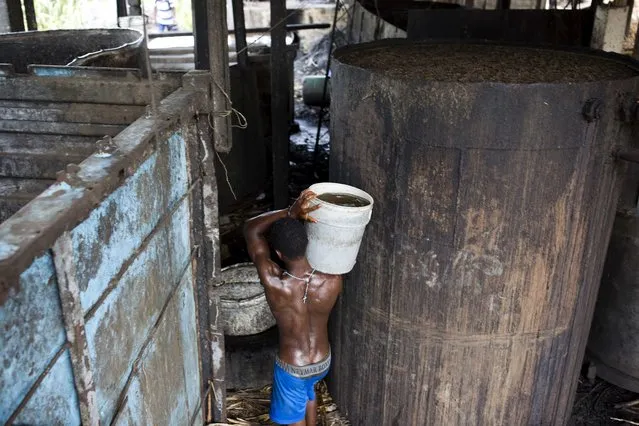
In this June 16, 2017 photo, Gabriel Shnaider, 22, carries a bucket of sugar cane juice to a large container where it will be fermented at the Ti Jean distillery where the sugar-based alcoholic spirit clairin is produced in Leogane, Haiti. Clairin, or kleren as it’s known in Haitian Creole, is less refined than rum and typically not aged, though some artisanal varieties are subjected to an aging process to give them a more mellow and distinctive flavor. (Photo by Dieu Nalio Chery/AP Photo)
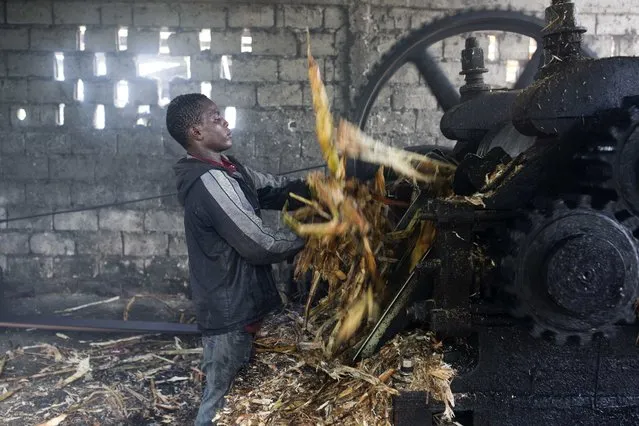
In this June 16, 2017 photo, Metson Pierre removes bagasse, fiber left over after pressing juice from sugar cane, from a grinding machine at the Ti Jean distillery where a sugar-based alcoholic drink called clairin is made in Leogane, Haiti. The 17-year-old, who was missing school, said he works to support himself after the death of his parents. (Photo by Dieu Nalio Chery/AP Photo)
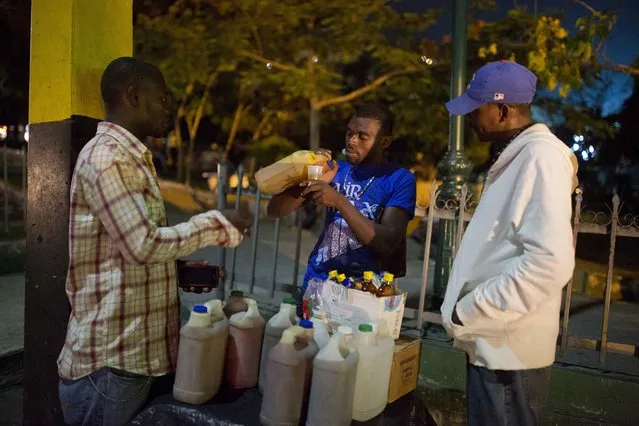
In this June 23, 2017 photo, Smith Nazon, 29, sells clairin, a sugar-based alcoholic drink, on the sidewalk in Petion-Ville, Haiti. A 1 liter bottle sells for about $1.36 dollars, about one-eighth the price of the least expensive bottle of Barbancourt rum, Haiti's most famous export. (Photo by Dieu Nalio Chery/AP Photo)
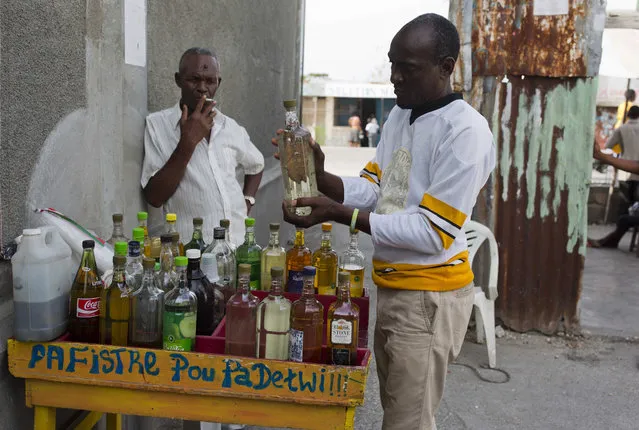
Eddy Lecty shakes a bottle of clairin, a sugar-based alcoholic drink, after adding clove spice to it, as his father Wilfrid Yves Nader smokes nearby and they wait for customers in the Cite Soleil area in Port-au-Prince, Haiti, Tuesday, July 11, 2017. The father-son business has been selling different flavors of clairin at this spot for almost 20 years, which has turned into a meeting place locals coined The Citizens Club. (Photo by Dieu Nalio Chery/AP Photo)
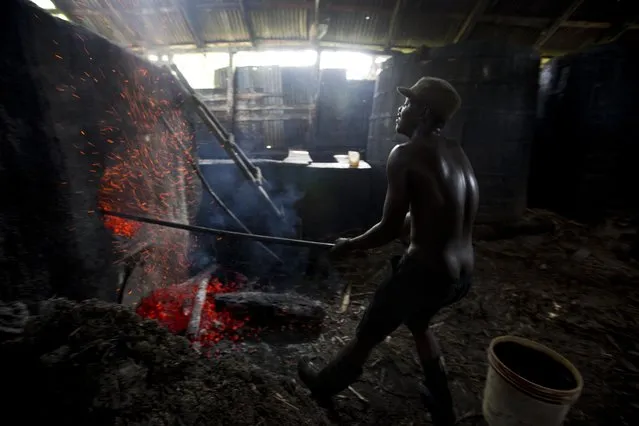
In this June 16, 2017 photo, Batel Delciner, 23, removes wood from a furnace to lower the heat cooking sugar juice at the Ti Jean distillery, which produces clairin, a sugar-based alcoholic drink, in Leogane, Haiti. The broth is cooked for about four hours after a fermentation period of four to eight days. (Photo by Dieu Nalio Chery/AP Photo)

In this June 17, 2017 photo, Ronald Sincere, 20, right, lights his cigarette from that of Medez Cazeau, 42, as they take a break from cutting sugar cane on the Aubry farm in a rural area of Leogane, Haiti. The men migrated from Petit Goave to work year-round on this farm, about 45 minutes away by car, earning 800 gourdes, or about $12.50 dollars for each truck they fill with cane. The men said they manage to fill one truck in two days, which is used to make clairin, a sugar-based alcoholic drink. (Photo by Dieu Nalio Chery/AP Photo)
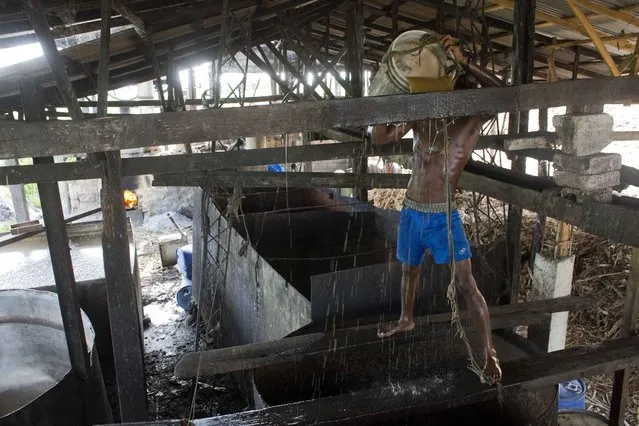
In this June 19, 2017 photo, Gabriel Shnaider, 22, pours sugar cane water into a boiler at the Ti Jean distillery, which produces clairin, a sugar-based alcoholic drink, in Leogane, Haiti. At Ti Jean, after the juice is fermented and filtered, it is shipped in plastic jugs to be sold in market stalls and by street merchants around the region. Individual retailers add flavors with herbs or fruit. (Photo by Dieu Nalio Chery/AP Photo)

In this June 16, 2017 photo, workers pass banana trees as they walk through a field of bagasse, the sugar cane fiber left over after its juice is extracted, on a farm where they work at the Ti Jean distillery to make clairin, a sugar-based alcoholic drink, in Leogane, Haiti. Workers live rent-free in a village on the farm but pay for their own food on a salary of 800 gourds, or $12.50 dollars for each truck they load with cut sugar cane. Workers say they're able to fill one truck in two days. (Photo by Dieu Nalio Chery/AP Photo)
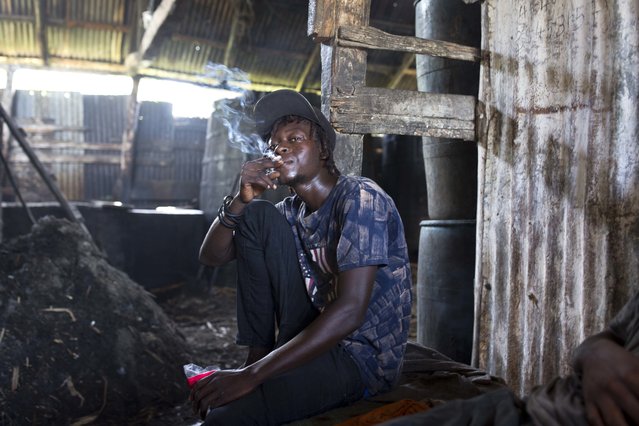
In this June 16, 2017 photo, Beneche Dadou, 20, smokes a cigarette and drinks clairin, a sugar-based alcoholic drink, at the Ti Jean distillery where it's made in Leogane, Haiti, as he takes a break from hauling bagasse, the fiber left over after pressing the juice from the cane. A liter of clairin sells for about $1.36, one-eighth the price of the least expensive bottle of Barbancourt. That price tag makes all the difference in a country where about 60 percent of the population gets by on less than $2 a day. (Photo by Dieu Nalio Chery/AP Photo)
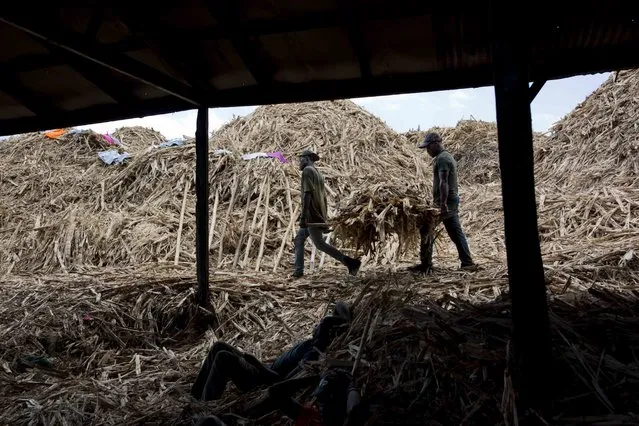
In this June 19, 2017 photo, Jean Rodelin Phillipe, 29, left, carries bagasse with Maxioner Laurent, 24, to be burned in a furnace at the Ti Jean distillery, which produces clairin, a sugar-based alcoholic drink, in Leogane, Haiti. Bagasse is the fiber left over after pressing the juice from the sugar cane, and is used to feed the fire that cooks clairin. (Photo by Dieu Nalio Chery/AP Photo)
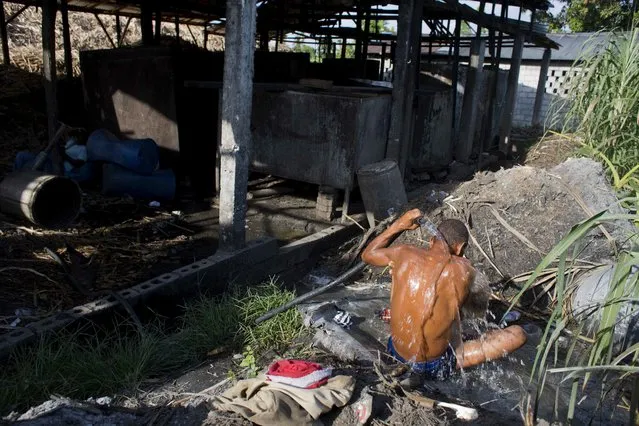
In this June 19, 2017 photo, a man washes off at the end of his eight-hour shift carrying bagasse, the fiber left over after pressing juice from sugar cane, at the Ti Jean distillery, which produces clairin, a sugar-based alcoholic drink, in Leogane, Haiti. Clairin, or kleren as it's known in Haitian Creole, is produced at hundreds of small distilleries scattered throughout Haiti. (Photo by Dieu Nalio Chery/AP Photo)
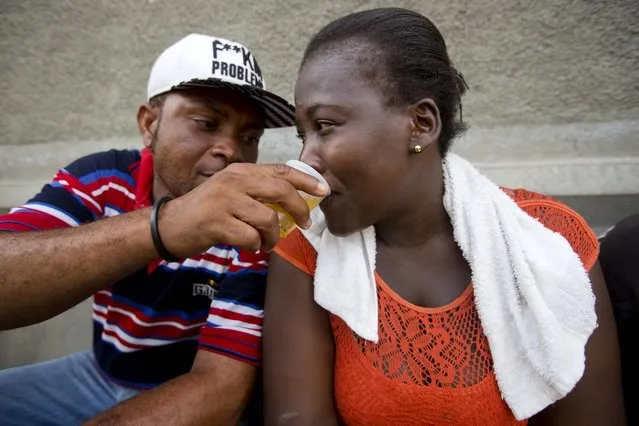
A man shares his clairin as he sits on the sidewalk where a vendor sells the sugar-based alcoholic drink in the Cite Soleil area of Port-au-Prince, Haiti, Tuesday, July 11, 2017. Clairin is rum's rustic cousin, a drink that's much cheaper and relatively rare outside this struggling Caribbean country. (Photo by Dieu Nalio Chery/AP Photo)
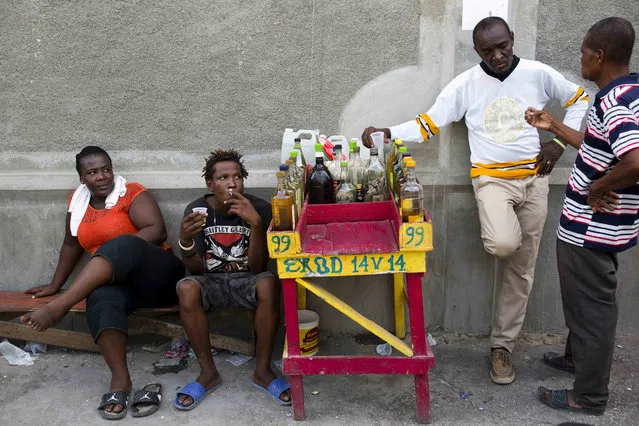
Eddy Lecty, who sells the sugar-based alcoholic drink known as clairin, second from right, talks to a client as his relative Junior Lecty and local Suzie Bazil, left, sit nearby in the Cite Soleil area of Port-au-Prince, Haiti, Tuesday, July 11, 2017. Eddy Lecty, who's selling spot has been coined by locals The Citizens Club, says people trust his product and former Haitians presidents like Rene Preval and Michel Martelly have stopped by to have a drink. (Photo by Dieu Nalio Chery/AP Photo)
12 Jul 2017 07:41:00,
post received
0 comments
